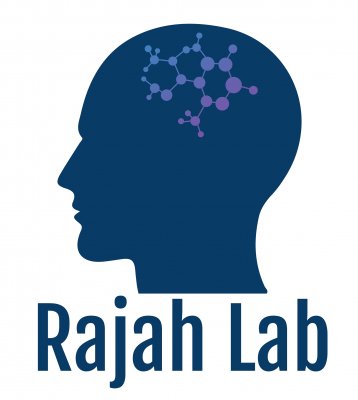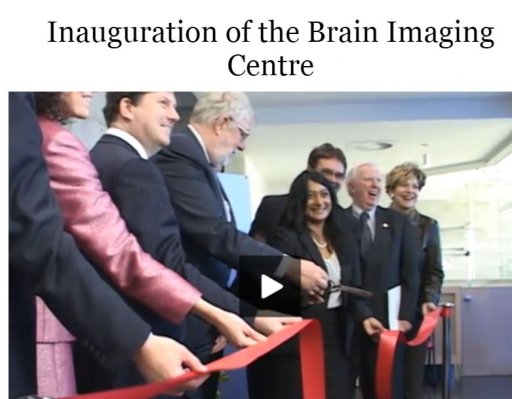
Media

Interview on BT Montreal, Aug 9, 2016
CityTV, August 9, 2016Television
URL: http://www.btmontreal.ca/videos/5077009100001/
Interview given on CityTV, Aug 9, 2016 - discussing memory decline in health aging.

NPR: The academic minute
NPR, October 10, 2016Radio/Podcast
URL: https://academicminute.org/2016/10/natasha-rajah-featured-on-the-best-of-our-knowledge/
One minute summary of recent research published by my lab.
Middle-age memory decline
McGill University Press Release, August 1, 2016Print
URL: http://www.mcgill.ca/newsroom/channels/news/middle-age-memory-decline-matter-changing-focus-261683
Discussion on findings from: “Changes in the modulation of brain activity during context encoding vs. context retrieval across the adult lifespan,” E. Ankudowich, S. Pasvanis, M.N. Rajah, NeuroImage, June 14, doi:10.1016/j.neuroimage.2016.06.022

Inauguration of the Douglas BIC
Douglas Mental Health University Institute, May 1, 2012Online
URL: http://www.douglas.qc.ca/videos/216
The opening ceremony of the Douglas Brain Imaging Centre.
Region-specific changes in prefrontal function with age: a review of PET and fMRI studies on working and episodic memory
Published by Brain
September 1, 2005
Abstract Several neuroimaging studies of cognitive ageing have found that age-related deficits in working memory (WM) and episodic memory abilities are related to changes in prefrontal cortex (PFC) function. Reviews of these neuroimaging studies have generally concluded that with age there is a reduction in the hemispheric specialization of cognitive function in the frontal lobes that may either be due to dedifferentiation of function, deficits in function and/or functional reorganization and compensation. Moreover, previous reviews have considered the PFC as homogeneous in function and have not taken into account the possibility that region specific changes in PFC function may occur with age. In the current review we performed a qualitative meta-analytic review of all the functional magnetic resonance imaging ageing studies and positron emission tomography ageing studies of WM and episodic memory that report PFC activation, to determine if any region-specific changes occur. The results indicated that in normal ageing distinct PFC regions exhibit different patterns of functional change, suggesting that age-related changes in PFC function are not homogeneous in nature. Specifically, we hypothesize that normal ageing is related to the differentiation of cortical function in a bilateral ventral PFC and deficits in function in right dorsal and anterior PFC. As a result of these changes, functional compensation in left dorsal and anterior PFC may occur. We hope that future studies will be conducted to either confirm or counter these hypotheses.
Family history and APOE4 risk for Alzheimer's Disease impact the neural correlates of episodic memory by early midlife
Published by bioRxiv
January 24, 2017
Abstract Episodic memory impairment is a consistent, pronounced deficit in pre-clinical stages of late-onset Alzheimer’s disease (AD). Individuals with risk factors for AD exhibit altered brain function several decades prior to the onset of AD-related symptoms. In the current event-related fMRI study of spatial context memory we tested the hypothesis that middle-aged adults (MA; 40-58yrs) with a family history of late onset AD (MA+FH), or a combined +FH and apolipoprotein E ε4 allele risk factors for AD (MA+FH+APOE4), will exhibit differences in encoding and retrieval-related brain activity , compared to – FH –APOE4 MA controls. We also hypothesized that the two at-risk MA groups will exhibit distinct patterns of correlation between brain activity and memory performance, compared to controls. To test these hypotheses we conducted multivariate task, and behavior, partial least squares analysis of fMRI data obtained during successful context encoding and retrieval. Our results indicate that even though there were no significant group differences in context memory performance, there were significant differences in brain activity and brain-behavior correlations involving hippocampus, left angular gyrus, cingulate, and precuneus in MA with AD risk factors, compared to controls. In addition, we observed that brain activity and brain-behavior correlations in anterior-medial PFC and in ventral visual cortex differentiated the two MA risk groups from each other, and from MAcontrols. This is the first study to show that there are differences in the brain areas engaged during context memory encoding and retrieval in middle-aged adults with +FH and +APOE-4 risk factors for late onset AD, compared to controls.
URL: http://biorxiv.org/content/biorxiv/early/2017/01/23/102699.full.pdf
Changes in the correlation between spatial and temporal source memory performance and BOLD activity across the adult lifespan.
Published by Cortex
January 16, 2017
Abstract Studies investigating age-related functional differences associated with source memory have recently focused on the importance of clarifying the relationship between effects of age and performance on memory-related brain activations. One methodological challenge has been in discriminating between effects of age on memory-related brain activations that are independent from age-related differences in performance. In the current study, event-related functional magnetic resonance imaging (fMRI) was used to identify brain activity during spatial and temporal source encoding and retrieval across the adult lifespan. We used multivariate behavior partial least squares (B-PLS) to identify patterns of brain activity during source encoding and source retrieval that were associated with age and/or retrieval accuracy. The PLS analysis identified three significant effects. The first effect indicated that encoding and retrieval activity in fusiform, middle occipital–temporal and inferior parietal cortices increased with age and decreased with performance. The second effect showed that dorsolateral prefrontal cortex and limbic activity increased with age at encoding, and increased with performance at retrieval. The third effect indicated that activity in right ventrolateral prefrontal and bilateral hippocampus increased with age during retrieval and was differentially related to performance during encoding versus retrieval. We conclude that although some age-related differences in brain activity observed during source encoding and retrieval are associated with individual differences in performance, age-related differences in prefrontal and hippocampal areas exhibit more complex patterns of interactions between age, performance, and phase-related activity.
URL: http://www.sciencedirect.com/science/article/pii/S0010945217300096
Biography
Dr. Natasha Rajah's research is in the area of cognitive neuroscience of aging and memory. Her research uses behavioral and neuroimaging methods to study the neural basis of learning and memory across the adult lifespan. One line of her research is focused on examining linear and non-linear changes in memory and brain function in adulthood to better understand why some adults age optimally, and others do not. Another line of her research explores how biological risk factors for Alzheimer's Disease impact memory and brain function at early adulthood and midlife. Specifically, how biological sex and menopausal status impacts memory and brain function in healthy middle age adults with versus without specific genetic risk factors for Alzheimer's Disease.
Recognition/Reconnaissance
Top 50 Under 50 Scientists in Quebec | Professional
Selected as one Quebec's top 50 scientists under the age of 50 by Quebec Science Magazine in 2012
CIHR New Investigator Award | Professional
Academic Salary Award from CIHR, New Investigator Competition (2007-2012)
Director, Douglas Brain Imaging Centre | Professional
Hired as Director of the Douglas Brain Imaging Centre in 2011.
Awarded FRQS Junior 2 Chercheurs Boursier | Professional
Academic Salary Award Received from FRQS (2013-2015)

